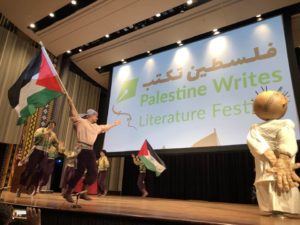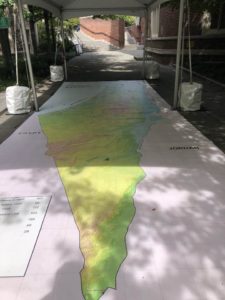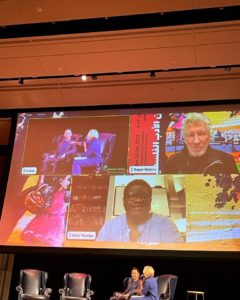Overcoming Zionism with the Power of Culture

Resist, my people, resist them.
Resist the colonialist’s onslaught.
Pay no mind to his agents among us
Who chain us with the peaceful illusion.
Do not fear doubtful tongues;
The truth in your heart is stronger,
As long as you resist in a land
That has lived through raids and victory.
—Palestinian Poet Dareen Tatour, “Resist, My People, Resist Them”
Author's note: This article was written and submitted just hours before the most recent Palestinian resistance to Israeli occupation began with rockets fired from Gaza, and Palestinian guerilla fighters entering Israeli territory. At the current moment the resistance has succeeded in smashing through historic barriers and defending the Palestinian people from their daily lives of violence. The following message was sent to puntorojo by one of the organizers of the Palestine Writes Festival from Gaza. He returned from Philadelphia to his family in Gaza arriving just before the resistance began:
What do they expect? For those who empathize with the settlers from the images that you see… Don't they know what they are doing to Palestinians in Gaza, West Bank? Do they think that they will live in peace eternally? When you oppress people, suppress them, suffocate them for long periods of time! What do you expect? We will come to get you, to take what is ours, to expel you, to materialize justice to our people… From the river to the sea, Palestine will be free! Long live Palestinian resistance in all fronts and forms in Gaza, historic Palestine, in USA and the diaspora!
For three beautiful days in Philadelphia, Palestinians celebrated their writing, history and culture at the University of Pennsylvania campus at the second Palestine Writes Literature Festival.
The festival, under the direction of novelist and activist Susan Abulhawa, featured more than 100 Palestinian writers, artists and organizers, who told stories about their Palestinian homeland and history and presented the wide intellectual diversity of Palestinian culture. More than 1,500 people bought tickets for the festival from all parts of the world. The event opened with a fierce affirmation of Palestinian struggle and survival by Penn faculty member and conference organizer Huda Fakkredine and closed with a crowd of nearly 1,000 people chanting “Free, Free, Palestine”.
The Festival featured luminous examples of Palestinian culture, like Dabke, Tatriz, a traditional textile art, and oral story-telling. It gave space to leading Palestinian scholars and intellectuals like Nur Nasrallah and Salman Abu Sittah, historians dedicated to preserving the story of Palestinian life and history in the face of the Nakba, or “catastrophe,” as Palestinians refer to the murder of thousands of Palestinians and forced exile of nearly 750,000 people in 1947-48 as Zionist forces violently established the state of Israel. The festival’s opening event was a screening of the 2021 film Farha by Jordanian/Palestinian filmmaker Darin J. Sallam. The film, which is available to watch on Netflix, tells the Nakba story of a 14 year-old girl who witnesses her village being ethnically cleansed by Zionist soldiers while fighting herself to stay alive.

Figure 1. The Freedom Dabka Group opened the Festival with a stirring rendition of traditional Palestinian dance.
But the festival was also a reminder of the fierce and vehement repression Palestinians face not only in their past and present homeland of Palestine under Israeli occupation, but anytime and anywhere they attempt to use their voice. About two weeks before the Festival took place, the national Anti-Discrimination League (ADL), a right-wing group which claims to monitor antisemitism, and the Philadelphia chapter of the Jewish Federation, wrote a letter to the University of Pennsylvania administration protesting the festival and the appearance of speakers it called “antisemitic” for criticizing the state of Israel. These speakers included festival director Susan Abulhawa and Pink Floyd founder Roger Waters, both of whom have spoken out and protested directly about Israel’s illegal occupation of Palestine, its violent treatment of Palestinians, and in support of Palestinian liberation.
The letter prompted the University President M. Elizabeth McGill to write its own open response validating without evidence every single accusation of antisemitism. The letter mimicked talking points of the ADL, suggesting that the presence of “antisemitic” speakers on the Penn campus could make Jewish students feels unsafe and promised to take numerous steps to combat antisemitism on campus. In short, the university administration validated and parroted the bogus claims that the Palestine Writes festival was antisemitic.

Figure 2. An enlarged map of historical Palestine at the Festival allowed people to find their ancestral homes.
Organizers of the Palestine Writes Festival responded to this blatant racism and Islamophobia with their own detailed letter to the University administration pointing out that criticizing the state of Israel was not the same as antisemitism. The letter also pointed out that the Penn administration had shown no regard for the safety and security of Palestinian students who were hoping to attend the festival to learn about their culture and enrich their educational experience. Unlike with the ADL letter, the Penn administration never responded to the festival organizers, further dismissing and ignoring the lives of Palestinians.
The Penn administration’s response was a reminder that most American universities are ruling-class institutions deeply embedded within and complicit with American governmental support for Israel. Penn itself is built on stolen Lenape territory as acknowledged by organizers of the Festival. The University’s racism and colonial attitude towards Palestinians was thus a sequel to the long violence perpetuated by setter-colonial partners in crime like Israel and the United States.
In fact, the Penn Administration’s open legitimation of Zionist claims and principles widened the floodgate for racist attacks on the Festival and its participants. Trucks with electronic message boards circled the campus before and after the Festival proclaiming “Shame on Penn” and featured images of Rogers Waters performing on stage in a faux-fascist uniform meant to suggest he was an antisemitic threat to Jews. Waters’s performance is in fact a satirical attack on authoritarian states. Organizers were also subject to racist attacks on social media, proclaimed “towel heads” and terrorists, while mainstream media repeated Zionist talking points that the Festival was a threat to Jews.
Through it all the organizers of the Festival held their ground. When the University administration tried to tie the festival to an antisemitic incident at the campus Hillel Center, organizers condemned antisemitism and repudiated the University’s racist claims. Festival organizers also sought and received legal help from the important civil rights group Palestine Legal which insisted that the festival proceed without “racist censorship.”
The attempt to silence and “imprison” Palestinians even in America was all too familiar to Palestinians who have seen many of their greatest writers and political leaders, like Ghassan Kanafani and Dareen Tatour, assassinated or imprisoned by the Israeli state. The Marxist Kanafani for example was a member of the Popular Front for the Liberation of Palestine. His novels and journalism, like his book Men in the Sun and Other Stories were uncompromising in their resistance to settler colonialism and capitalism: A new book about Kanafani by his widow Anni captures his story.

Figure 3: Plenary session hosted by Rachel Holmes featuring novelist Viet Thanh Nguyen, journalist Gary Younge, and musician Rogers Water talking about friendship and solidarity with Palestinians.
But the festival also drew support from many quarters of people who refused to buy the Zionist narrative and stood strong for Palestinian voices. In fact, 36 faculty at the University signed a letter slamming the University’s racist response supporting the festival. Arab students at Penn defended by the festival and their right to an education free of racist attacks. Palestinian writer Saree Makdisi wrote a beautiful essay defending Palestinians from the constant onslaught they face especially on University campuses.
Progressive Jewish groups like Jewish Voice for Peace spoke out for the festival. A progressive Penn Jewish student group, Penn Chavurah, also spoke against attempts to equate Judaism with Zionism and wrote in open support of the Festival. Voices like Penn Chavurah proved that Judaism and Zionism should never be conflated and that many Jews are themselves now opposed to Israel’s violent settler regime.
These testimonials and the sheer bravery, persistence and brilliance of the Palestinians participating in Palestine Writes won the day. They overcome Zionist threats and Zionist institutions by refusing to back down and standing up for Palestinian liberation and freedom of expression. As the Martiniquian anti-colonial freedom fighter and philosopher Frantz Fanon once wrote, people of culture “take their stand in history” as part of the effort to refuse colonialism’s drive to eliminate the native and the indigenous, including their language, books and ideas. Palestine Writes was a triumph of the word and the pen, a sword and a shield against Zionist, settler-colonial practices of elimination, and a joyful shout of defiance to the world.
Bill V. Mullen is a member of the Puntorojo Editorial Collective and of the organizing collective for the US Campaign for Academic and Cultural Boycott of Israel.

